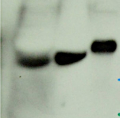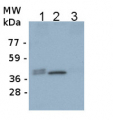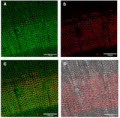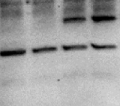Triticum sp.Below you will find antibodies with confirmed or predicted reactivity to Triticum sp. Protocols and Technical Information • Support • Western Blot Video Tutorials |  |

AS15 3091 | Clonality: Polyclonal | Host: Rabbit | Reactivity: Arabidopsis thaliana, Brachypodium distachyon, Deschampsia antarctica, Oryza sativa

AS16 3135-1ml | Clonality: monoclonal | Host: Mouse | Reactivity: A. pseudoplatanus, A. thaliana, Phormium sp., S. lycopersicum, S. tuberosum, T. indicus
From the laboratory of Michael G. Hahn, PhD, University of Georgia

AS16 3227-1ml | Clonality: monoclonal | Host: Mouse | Reactivity: Phormium sp., Sorghum sp., Triticum sp., Zea mays
From the laboratory of Michael G. Hahn, PhD, University of Georgia

AS16 3229-1ml | Clonality: monoclonal | Host: Mouse | Reactivity: Betula sp., Eucalyptus sp., Populus sp., Sorghum sp., Triticum sp.
From the laboratory of Michael G. Hahn, PhD, University of Georgia

AS16 3932 | Clonality: Polyclonal | Host: Rabbit | Reactivity: Amaranthus hypochondriacus, Arabidopsis thaliana, Glycine max, Zea mays

AS16 3976 | Clonality: Polyclonal | Host: Rabbit | Reactivity: Arabidopsis thaliana, Brassica oleracea var. botrytis cv. ’Diadom’, [compartment marker] of mitochondrial inner membrane
Benefits of using this antibody

AS16 4032 | Clonality: Polyclonal | Host: Rabbit | Reactivity: Hordeum vulgare, Oryza sativa, Triticum aestivum, Zea mays
Interested to receive a free sample for testing? Contact us.


AS18 4168 | Clonality: Polyclonal | Host: Rabbit | Reactivity: Arabidopsis thaliana, Brachypodium distachyon, Oryza sativa, Solanum tuberosum

AS18 4169 | Clonality: Polyclonal | Host: Rabbit | Reactivity: A. thaliana, C. reinhardtii, Echinochloa crus-galli, M. polymorhpa, M. sativa, N. oceanica, Panicum miliaceum, P. sativum, Z. mays

From the laboratory of Paul Knox, Phd, University of Leeds, United Kingdom

From the laboratory of Paul Knox, Phd, University of Leeds, United Kingdom

From the laboratory of Paul Knox, Phd, University of Leeds, United Kingdom

From the laboratory of Paul Knox, Phd, University of Leeds, United Kingdom

From the laboratory of Paul Knox, Phd, University of Leeds, United Kingdom

From the laboratory of Paul Knox, Phd, University of Leeds, United Kingdom

From the laboratory of Paul Knox, Phd, University of Leeds, United Kingdom












